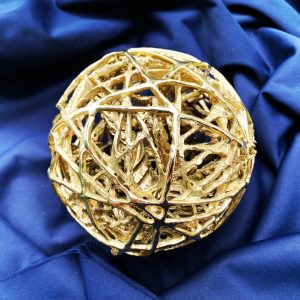Láchesis, Klothó, Átropos – an die Schicksalsgöttinnen
op. 107, 2024
For mixed choir
Duration: 12 min.
I. Prologue – as a prayer
II. Láchesis – with admiration
III. Klothó – declamatory
IV. Átropos – thoughtful
V. Epilogue – with hope
Texts: Fragments from the Orphic Hymns to the Moires, to the Earth, Moon and Sun in Ancient Greek and Konstantia Gourzi’s own texts in German
Commissioned by the Bach Choir Salzburg
World premiere: June 8, 2024, Carabinieri Hall of the Residenz, Salzburg
Choir: Bach Choir Salzburg
Conductor: Konstantia Gourzi
Composer’s Notes
Láchesis, Klothó, Átropos – an die Schicksalsgöttinnen was commissioned by the Salzburg Bachchor for a concert in their own concert series “Chorage”, which is dedicated to fate.
I find it more interesting and necessary than ever to deal with the subject of fate today. Asking the question of whether we are powerless in the face of our fate or whether we can determine our own destiny and seeking the answer through music made me curious and at the same time grateful and happy about this task.
The word Móires (in ancient Greek Μοῖραι, goddesses of fate) comes from the ancient Greek verb moiráso (I divide). The three goddesses of fate share the time of life: the past, the present and the future. Klothó, the goddess of the present, spins the thread of life, Láchesis, the goddess of the past, measures the thread of life and Átropos, the goddess of the future, cuts the thread of life.

My friend, the visual artist Alexander Polzin, depicts the goddesses of fate intertwined in a small gold sculpture, dancing in a cocoon of the thread of fate.
This sculpture and its symbolism inspired me to create the dramaturgy of the composition. I was inspired by Plato and the Orphic hymns, which deal with fate, and decided to use fragmentary texts from the Orphic texts (in ancient Greek) to the Móires for the prologue and epilogue. For the three goddesses, I used fragments of the three Orphic hymns dedicated to the planets Moon, Earth and Sun and mixed them with my own texts (in German).
The composition therefore consists of five parts, which are musically constructed from different sound elements. It was important to me to always lead the choir as a unison voice. This conveys the sound as a powerful whole and is intended to create the mood of a ritual.
The ritual begins with the prologue: a mood like a call, like a prayer is created: calls to the Moires to ask them to listen to us humans. In the pieces Láchesis, Klothó, and Átropos, solos lead at the beginning of each piece and the choir follows them. In all three pieces, the melodic, the spoken (or declaimed) and the rhythmic are strongly emphasized. The epilogue concludes the ritual with a song sung in unison, calling on the Moires with hope to dispel the pain of the world and bring mercy. The power of this collective rhythmic singing is particularly emphasized and celebrated.
